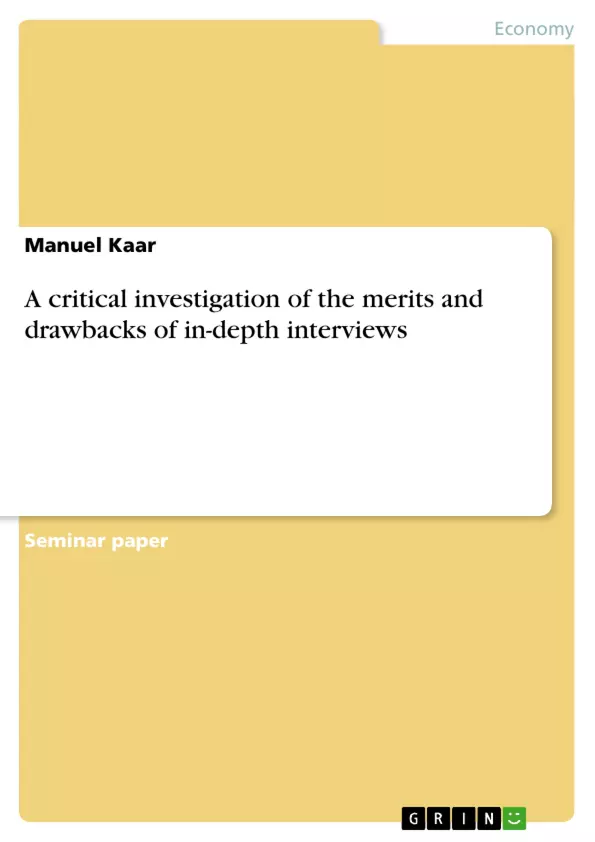When commencing to plan a study, researchers face the oftentimes challenging
task to decide on the adequate research method for their investigation problem
at hand. Since the appropriateness of a study, as well as its ability to be
accepted as scientific research, depend very much on the correct choice of the
applied research method(s), the decision process for the latter constitutes a
crucial phase of the overall research operation.
As many researchers encounter ambiguities when it comes to selecting the
suitable research technique, this paper provides a critical reflection on several
arguments for and against the employment of in-depth interviews, one of the
most common tools used in qualitative research.
The aim of this paper is, therefore, to consider the strengths and weaknesses of
in-depth interviews from various angles, in order to advance the perspicuity of
the question in which situations it is apt to use interviews as a research tool and
when to better search for alternative methods.
To arrive at this objective, four main issues have been explored through a
review of already existing literature. First, the merits of individual in-depth
interviews are examined. Then the paper addresses the question of what
possible drawbacks one may come across when selecting in-depth interviewing
as a research method. Furthermore, a short comment on the application of indepth
interviews in qualitative tourism research is given. Finally, in the
conclusions/recommendations section it is explained for which types of
investigations the in-depth interview is the appropriate research technique.
As indicated above, the main focus of this paper is not on providing a guide for
the general set-up and implication process of an in-depth interview. The main
spotlight is rather on the enhancement of the detailed knowledge of researchers
on in-depth interviews, with the ultimate goal to make a contribution to increase
the number of cases where research methods have been appropriately chosen.
Hence, a certain level of previous knowledge about in-depth interviewing is
expected from the reader in order to be able to follow the content of this paper.
Inhaltsverzeichnis (Table of Contents)
- Introduction
- The benefits of individual in-depth interviews
- General aspects
- The depth of data and the focus on perceptions
- Individuality of in-depth interviews
- Involvement of the researcher
- Possible drawbacks of in-depth interviewing
- Costs and time
- Interviewer bias and interpretation
- Limitation of cases and lack of interaction with peers
- Simplification of complexity through themes
- Excursion: The application of in-depth interviews in tourism research
- Conclusions / Recommendations: When to use or avoid in-depth interviews
- Reference List
- Bibliography
Zielsetzung und Themenschwerpunkte (Objectives and Key Themes)
This paper provides a critical reflection on the merits and drawbacks of using in-depth interviews in qualitative research. The main objective is to examine the strengths and weaknesses of this research tool from various angles, with the goal of clarifying when it is appropriate to use interviews and when it is better to utilize alternative methods.
- The benefits of in-depth interviews
- Possible drawbacks of in-depth interviewing
- The application of in-depth interviews in tourism research
- Recommendations for using or avoiding in-depth interviews
- Comparison of in-depth interviews to other research methods
Zusammenfassung der Kapitel (Chapter Summaries)
The introduction discusses the importance of choosing the right research method for a study and emphasizes the significance of in-depth interviews in qualitative research. The paper then delves into the advantages of in-depth interviews, highlighting their ability to delve into the respondent's motivations, empower respondents by allowing them to speak freely, and provide detailed and authentic insights. The paper also discusses the depth of data and focus on individual perceptions that are unique to in-depth interviews. Additionally, it underscores the individuality of each interview and the researcher's active involvement in the research process.
Schlüsselwörter (Keywords)
This paper focuses on the in-depth interview method, analyzing its advantages and disadvantages in qualitative research. The main themes explored include the depth of data, the focus on individual perceptions, the researcher's involvement, and the importance of considering costs, time constraints, and potential bias. Additionally, the paper examines the application of in-depth interviews in tourism research and provides recommendations for using or avoiding this research technique.
Frequently Asked Questions
What are the main benefits of in-depth interviews in qualitative research?
In-depth interviews allow for a focus on individual perceptions, provide detailed and authentic data, and empower respondents to speak freely about their motivations.
What are the potential drawbacks of using in-depth interviews?
Common drawbacks include high costs and time requirements, potential interviewer bias, and the difficulty of generalizing results due to a limited number of cases.
How does the researcher's involvement affect the interview process?
The researcher is actively involved, which can help in building rapport but also risks introducing personal bias during data collection and interpretation.
In which situations is an in-depth interview the most appropriate method?
It is ideal for exploring complex personal issues, sensitive topics, or when the research objective is to understand deep-seated individual attitudes and behaviors.
How are in-depth interviews applied in tourism research?
They are used to understand traveler motivations, experiences, and perceptions that cannot be captured by simple quantitative surveys.
- Quote paper
- B.A. Manuel Kaar (Author), 2007, A critical investigation of the merits and drawbacks of in-depth interviews, Munich, GRIN Verlag, https://www.grin.com/document/136975



